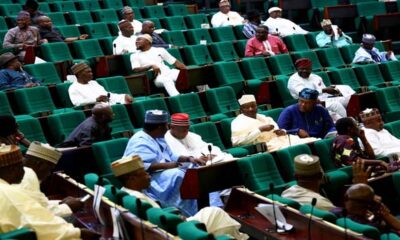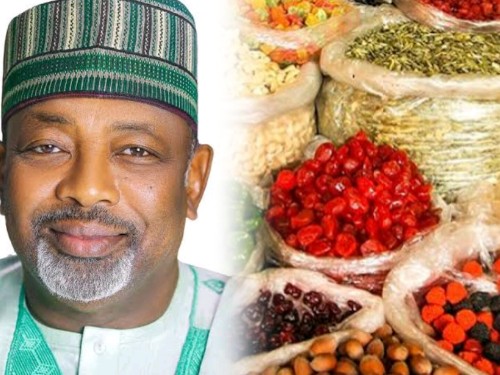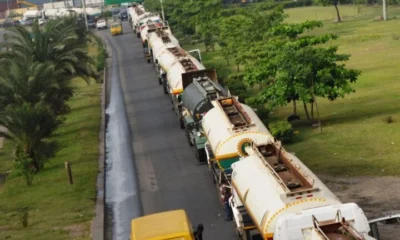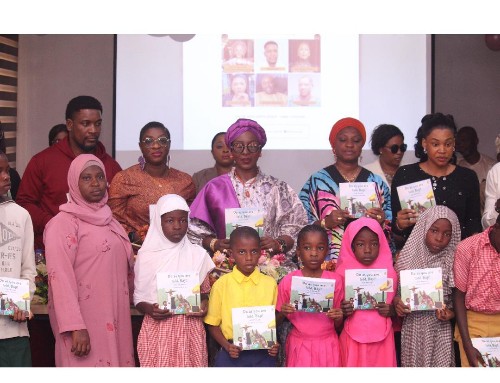The Federal Government has announced that it expects food prices to decrease significantly within the next 180 days (by January 2025) due to strategic measures aimed at addressing high food prices across the country.
These measures include the temporary suspension of duties, tariffs, and taxes on the importation of certain food items through land and sea borders, as well as the importation of 500,000 metric tonnes of wheat and maize.
According to the Minister of Agriculture and Food Security, Abubakar Kyari, the imported food commodities will be sold at a recommended retail price to ensure quality standards.
The All Farmers Association of Nigeria has expressed optimism that food prices will decrease if the government effectively implements these policies, noting that domestic food production has been insufficient.
The organized private sector has also commended the government’s initiative as robust, comprehensive, and inclusive.
In his posts on X (formerly known as), the agriculture minister said, “Our administration has unveiled a series of strategic measures to address the high food prices currently affecting our nation. These measures will be implemented over the next 180 days: 150-day duty-free import window for food commodities; suspension of duties, tariffs, and taxes for the importation of certain food commodities through land and sea borders. These commodities include maize, husked brown rice, wheat, and cowpeas.
“Imported food commodities will be subjected to a recommended retail price. We understand concerns about the quality of these imports, especially regarding their genetic composition. The government assures that all standards will be maintained to ensure the safety and quality of food items for consumption.
“The Federal Government will import 250,000 metric tonnes of wheat and 250,000 metric tonnes of maize. These semi-processed commodities will be supplied to small-scale processors and millers across the country; engagement with relevant stakeholders to set a GMP ( good manufacturing practices) and purchase surplus food commodities to restock the National Strategic Food Reserve.”
Kyari said the government would ramp up production for the 2024/2025 farming cycle, adding that there would be continued support to smallholder farmers during the ongoing wet season farming through existing government initiatives.
He outlined other measures as “strengthening and accelerating dry season farming nationwide, embarking on aggressive agricultural mechanisation to reduce drudgery, lower production costs, and boost productivity, collaborating with sub-national entities to identify irrigable lands and increase land under cultivation.
The minister said the ministry would be “working closely with the Federal Ministry of Water Resources and Sanitation to rehabilitate and maintain irrigation facilities under river basin authorities across the federation. Developing strategic engagement for youths and women for immediate greenhouse cultivation of horticultural crops such as tomatoes and pepper to increase production volume, stabilise prices, and address food shortages.
“Fast-tracking ongoing engagements with the Nigerian military to rapidly cultivate arable lands under the Defence Farms Scheme and encouraging other para-military establishments to utilise available arable lands for cultivation.
On the Renewed Hope National Livestock Transformation Implementation Committee, the minister stated that the committee, inaugurated on Tuesday, would develop and implement policies prioritising livestock development in alignment with the National Livestock Transformation Plan, adding that a ministry of Livestock Development has been created.
Kyari said the government would enhance nutrition security by promoting the production of fortified food commodities, supporting the scale-up of the Home Garden Initiative by the Office of the First Lady of the Federal Republic of Nigeria.
“Over the next 14 days, in close collaboration with the Presidential Food Systems Coordinating Unit, and the Economic Management Team, we will convene with respective agencies to finalise the implementation frameworks. We will ensure that information is publicly available to facilitate the participation of all relevant stakeholders across the country.
“The success of these measures hinges on the cooperation and collaboration of all relevant MDAs (ministries, departments and agencies) and stakeholders. As our nation confronts this critical food security challenge, I reiterate President Bola Tinubu’s unwavering commitment to achieving food security and ensuring that no Nigerian goes to bed hungry. My team and I will work swiftly and diligently to actualise these crucial policies, ensuring food security for everyone in the immediate term while continuing our strategies for long-term interventions to address underlying causes and ensure sustainable and resilient food systems in Nigeria.
- Local Production Insufficient
Commenting on the plans, the All Farmers Association of Nigeria lauded the initiative of the Federal Government on the lifting of taxes on food importation, as well as the importation of 500,000MT of wheat and maize.
The South-West Chairman of AFAN, Femi Oke, pointed out that food prices in Nigeria had continued to rise due to low production, stressing that it was the right thing to do by importing these items.
He stated, “It is a welcome development because the prices of food items have continued to rise and are now very high for most Nigerians. So we believe that with the introduction of a duty-free importation policy on the food items, the cost of these commodities will drop,” he stated.
When asked if the policy would not adversely impact local food production, the AFAN official replied, “No it can’t, because what we are producing in the country is not even enough. Our population is increasing every day and removing the taxes would lead to the importation of more food into the country.
“As the food importation increases, the price of food items in the country will reduce. So the initiative is encouraging this time because the prices of food items are so high and this is affecting all sectors of the economy.”
Recall that Kyari had explained on Monday that the Presidential Accelerated Stabilisation and Advancement Plan was an initiative of President Tinubu to bring about food security and economic stability to Nigeria.
He noted that over the past several months, “we have all been witnesses to the escalating cost of food items in all parts of the country. There is virtually no food item that has not had its price raised to a level higher than what a good many Nigerians can afford.”
The minister stated that the affordability crisis in our food security system had been indexed by the data from the National Bureau of Statistics which by the last count, had put food inflation at 40.66 percent.
“We have heard the cries of Nigeria over the prices of food items and condiments, with some now describing tomatoes as gold and proposing a variety of recipes to prepare soups and dishes with some of the overly priced food items.
“What in the past were regarded as common items such as yam, plantain, and potato now command excessively high figures and Nigerians are right to wonder how and why things are the way they are.
“As a government under the leadership of President Tinubu, members of the Federal Executive Council and indeed all other operatives in the MDAs are fully aware of the hardship occasioned by the high cost of food items in our country. There is no doubt that food inflation is a direct consequence of a number of factors,” Kyari stated.
He said agricultural production activities had been hampered in some parts of the country by a number of factors resulting in the inability of smallholder farmers to contribute optimally to the country’s food basket.
This, he said, had opened a new dimension to the food challenge from affordability to availability of sufficient food commodities.
“As you may recall, earlier in the year, there were a number of interventions by the Federal Government to make food available and to dampen their prices. Those interventions include the release of 42,000MT of assorted food commodities from the National Strategic Food Reserve, 58,500MT purchase of milled rice from the Rice Processors Association of Nigeria and an additional 30,000MT of rice.
“Regrettably, prices have continued to escalate, and in some cases these days, food items are becoming unavailable. The Government cannot allow this situation to persist. While there are ongoing agricultural initiatives, programmes and projects under the Federal Ministry of Agriculture and Food Security, and state governments also have theirs, we must respond to the creeping availability crisis.
“As the government continues to encourage agricultural production on a sustainable and profitable basis for farmers, the time lag between cultivation and harvest makes it inevitable for the government to kick in stop-gap measures that will bring tremendous relief to Nigerians.
“For instance, harvest for 2024 wet season farming will not be due until October-November. On the one hand, while the measures aim to alleviate immediate food shortages, we will strengthen domestic production capabilities to enhance long-term food security,” the minister stated.
Kyari pointed out that the causative factors in the country’s food inflation figures include infrastructural challenges, multiple taxes and levies, and the sheer profiteering by marketers and traders.
Reacting, the National President of the Nigerian Association of Chambers of Commerce, Industry, Mines and Agriculture, Dele Oye, commended the Federal Government on the move.
He said, “The food price crash is a good move, and we are looking forward to it. We are very happy about it and we are in support.”
In a similar vein, the National President of the Association of Small Business Owners of Nigeria, Dr Femi Egbesola, said he was optimistic about seeing the implementation of the initiative.
He said, “I receive this news with utmost joy and excitement, praying and hoping that all will go as enumerated. It is very robust, comprehensive, and all-inclusive; no doubt, it will push down the prices of food and agricultural products and will strongly arrest food inflation which indeed is the highest driver of inflation at the moment. Hence, it is a win-win situation for all.
“I am even impressed that there’s provision to off-take excess agricultural products from farmers, support smallholder farmers, and adopt more technology and mechanisation in the farming business.
“It will positively impact the SMEs, particularly those whose primary inputs are agricultural products. It will also improve sales and profitability if inflation is arrested and driven down. This is the kind of body language and kick-fix policies we expect of a responsive and responsible government.”
He noted that for the food prices crash to succeed, willpower, transparency, collaboration, and a corruption-free process were essential.
Egbesola said, “I do hope enough will also be done with the collaboration of critical stakeholders in the private sector to implement, monitor, evaluate, and ensure the success of the processes and procedures of this laudable initiative.”
But the National Vice President of the Nigerian Association of Small-Scale Industrialists, Segun Kuti-George, however, noted that the crash of food prices was like a two-edged sword.
He said, “The truth of the matter is, there are usually two sides to a coin, and that’s one of the dynamics of economics. As you are trying to solve a problem, you are likely to be creating another. While it is good to crash or bring down the cost of food, being the first line of human needs, we have to consider how they intend to do it. If the government wants to crash the price of food by importing food into the country or by removing the tariff, as they said, it has implications.
“Yes, on one side, it would be a good thing for the populace because they will be able to buy food at affordable prices. However, the other part of it is the locally grown food items and the cost of producing them, which will affect the price. If the price of food that is produced locally is higher than that of the ones being imported, it would be to the detriment of the locally produced food.”
Kuti-George canvassed for subsidies on the cost of production of locally produced food or off-take of their food.
He advised, “So, what the government can do in that instance, therefore, is to subsidise the cost of production of the locally produced food or off-take their food, buy it at the price that will give them profit, and then sell it in the market at lower prices. While it is good for the populace to have lower prices of food items, we have to think of how we are doing it.
“The long-term solution would be to boost local production of food items so that when it is available when there is supply, prices will normally come down. How that can be done is to subsidise agricultural inputs, provide modern technology for agriculture, and fund farmers massively through their cooperatives and associations.”
According to him, the issue of security is also on the front burner of what needs to be addressed by the Federal Government.
He added, “We must not forget the fact that the issue of security has to be taken care of. Even where farmers are ready to farm, where you have inputs supplied, where you have modern agricultural implements such as tractors and so on, if people cannot go to their farms, or they go to their farms and bring their cattle to graze, we still come back to the issue of food scarcity. So, this issue of security is very, very critical.
“I learned that President Tinubu is forming a Ministry of Livestock. Well, I do not understand the sense behind that, but I don’t see it solving the problem. What we need is to equip our military to go in there and deal with the situation.
“We can also put laws in place. If you graze your cattle on my land, there is a place to report, and action will be taken. By the time one, two, or three people are jailed or their animals seized, others will learn a lesson.”
Meanwhile, a member of the Nigerian Economic Summit Group, Dr Ikenna Nwosu, said it was not optimal to comment on an expressed intention.
He said, “When the Federal Government unfolds the measures for crashing the food prices, the duration of the intervention, and the plans for long-term food price control, then the appropriate evaluation will be undertaken, including socioeconomic implications and how the measures reflect the policy targets for food security set out in Nigeria’s Medium Term National Development Plan 2021-2025. For now, the public is simply listening to the Federal Government rhetoric, while awaiting the measures.”
Credit: The Punch

 BIG STORY5 days ago
BIG STORY5 days ago
 BIG STORY3 days ago
BIG STORY3 days ago
 BIG STORY4 days ago
BIG STORY4 days ago
 BIG STORY5 days ago
BIG STORY5 days ago
 BIG STORY3 days ago
BIG STORY3 days ago
 BIG STORY23 hours ago
BIG STORY23 hours ago
 BIG STORY23 hours ago
BIG STORY23 hours ago
 BIG STORY24 hours ago
BIG STORY24 hours ago

























